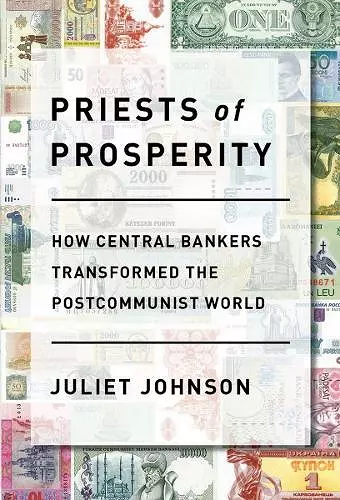Priests of Prosperity
How Central Bankers Transformed the Postcommunist World
Format:Paperback
Publisher:Cornell University Press
Published:15th Nov '19
Currently unavailable, and unfortunately no date known when it will be back

Priests of Prosperity explores the unsung revolutionary campaign to transform postcommunist central banks from command-economy cash cows into Western-style monetary guardians. Juliet Johnson conducted more than 160 interviews in seventeen countries with central bankers, international assistance providers, policymakers, and private-sector finance professionals over the course of fifteen years. She argues that a powerful transnational central banking community concentrated in Western Europe and North America integrated postcommunist central bankers into its network, shaped their ideas about the role of central banks, and helped them develop modern tools of central banking.
Johnson's detailed comparative studies of central bank development in Hungary, the Czech Republic, Slovakia, Russia, and Kyrgyzstan take readers from the birth of the campaign in the late 1980s to the challenges faced by central bankers after the global financial crisis. As the comfortable certainties of the past collapse around them, today's central bankers in the postcommunist world and beyond find themselves torn between allegiance to their transnational community and its principles on the one hand and their increasingly complex and politicized national roles on the other. Priests of Prosperity will appeal to a diverse audience of scholars in political science, finance, economics, geography, and sociology as well as to central bankers and other policymakers interested in the future of international finance, global governance, and economic development.
The United States is not the only country in which the consensus on central-bank independence is in trouble: central bankers across the former communist world are facing sustained political challenge as well. The difference in the latter is that central-bank norms, practices and policies never sat that well within regimes in transition, and the consensus spread only weakly beyond the central banks themselves. This is the argument Juliet Johnson makes in her brilliant book on the role that central bankers played in the transformation of the post-communist world.
(Survival: Global Politics and Strategy)Investigates how the transnational central banking community actively guided the transformation of postcommunist central banks through transplantation and its stages of choice, transformation, and internalization. Discusses why and how central bankers in advanced industrial democracies formed a cohesive community championing price stability and political independence in the 1900s.
(JOURNAL OF ECONOMIC LITERATURE)This book provides insight into an important element of the transition of postcommunist economies.
(Choice)How timely is Juliet Johnson's Priests of Prosperity, which highlights not only the intricacies of central bank development and practice but also the role of an international community of banks in shaping this development. The book provides an illuminating comparison of central bank evolution and transformation across a number of postcommunist countries, including Hungary, Kyrgyzstan, and Russia.
(Business History Review)Provides a unique theoretical framework for institutional emulation and a well-developed analysis of the diffusion of central bank independence throughout the postcommunist countries. It will be read and valued by experts and anyone working on the political economy of transition, central bank independence, or institutional emulation worldwide.
(Slavic Review)A substantively significant and exciting contribution to the field of comparative political economy and to the understanding of postcommunist societies' transformation. The book is clear and persuasive because of a combination of a carefully developed theory, a deep understanding of postcommunist countries, and a combination of qualitative and quantitative evidence.
(Perspectives on Politics)Priests of Prosperity is Juliet Johnson's exhaustively researched account of the adoption of politically independent, inflation-targeting central banking in the post-communist world.
(Economic and Political Wee- Winner of Canadian Political Science Association Prize in International Relations (CPSA) 2017 (United States)
- Winner of Marshall Shulman Book Prize 2017 (United States)
- Winner of Davis Center Book Prize in Political and Social Studies 2017 (United States)
- Joint winner of Ed A. Hewett Book Prize 2017 (United States)
- Short-listed for Donner Prize 2017 (United States)
ISBN: 9781501746826
Dimensions: unknown
Weight: 907g
312 pages